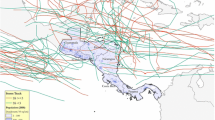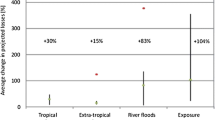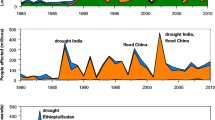Abstract
One strand of research relates the magnitude of severe weather disasters to climatic and human development factors; another highlights dramatic growth in catastrophe losses. However, there have been few attempts to put the two strands together. Here we use an explicit modeling framework to determine the contribution of climate variability relative to human factors in reported catastrophe losses. We then examine how future climate change can be expected to affect losses from natural disasters. Simultaneous regression models are constructed from three equations in which the dependent variables are U.S. flood loss, U.S. hurricane loss and U.S. catastrophe loss. Then two kinds of simulation under two climate change scenarios explore how climate change would affect losses. The climate change scenarios respectively project 13.5% and 21.5% increases in annual precipitation. The first simulation increases only the mean value of annual precipitation; the second simulation assumes that the mean and standard deviation of annual precipitation change in the same proportion. Results show that the growth in reported losses from weather-related natural disasters is due mainly to three socioeconomic factors: inflation, population growth and growth in per capita real wealth. However, weather variables such as precipitation and the number of hurricanes per period also clearly affect losses. The three stage least squares (3SLS) simultaneous equation model shows that a 1% increase in annual precipitation would enlarge catastrophe loss by as much as 2.8%. These findings are suggestive as planning signals to decision makers.
Similar content being viewed by others
References
Adams, C. R.: 1997, Impacts of Temperature Extremes, Report of Workshop on the Social and Economic Impacts of Weather, Boulder, CO.
Boswell, M. R.: 1999, ‘A Quantitative Method for Estimating Probable Public Costs of Hurricanes’, Environ. Manage. 23, 359–372.
Changnon, S. A.: 1998, Don't Blame the Climate: Extreme Weather and Insurance Losses, State of the Climate Report, pp. 13–17.
Crane, R. G. and Hewiston, B. C.: 1998, ‘Doubled CO2 Precipitation Changes for the Susquehanna Basin: Down Scaling from the GENESIS General Circulation Model’, Int. J. Clim. 18, 65–76.
Davidson, R. and MacKinnon, J. G.: 1993, Estimation and Inference in Econometrics, Oxford University Press, New York, pp. 675–676.
Dicky, D. A. and Fuller, W. A.: 1979, ‘Distribution of the Estimators for Autoregressive Time Series with a Unit Root’, J. Amer. Stat. Assoc. 74, 427–431.
Eviews: 1999, Version 3.1 Manual, Quantitative Micro Software.
Fisher, A. and 12 others: 2000, Preparing for a Changing Climate: The Potential Consequences of Climate Variability and Change-Mid-Atlantic Overview, prepared for USGCRP first national assessment, sponsored by U.S. Environmental Protection Agency, http://www.essc.psu.edu/ mara/results/index/html (accessed Jan. 9, 2002).
Gujarati, D. N.: 1995, Basic Econometrics, McGraw-Hill, New York.
Hebert, P. J., Jarrell, J. D., and Mayfield, M.: 1996, The Deadliest, Costliest, and Most Intense United States Hurricanes of this Century (and Other Frequently Requested Hurricane Facts), NOAA Technical Memorandum NWS NHC-31, NHC.
Insurance Services Office (ISO): 1996, Managing Catastrophe Risk, http://www.iso.com/docs/ stud001.htm (accessed January 15, 2002).
Insurance Services Office (ISO): 1994, The Impact of Catastrophes on Property Insurance, http://www.iso.com/docs/stud006.htm (accessed January 15, 2002).
IPCC (Intergovernmental Panel on Climate Change) Working Group: 2001, TAR (The Third Assessment Report), http://www.ipcc.ch. (accessed January 15, 2002).
Jenkins, G. S. and Barron, E. J.: 1997, ‘Global Climate Model and Coupled Regional Climate Model Simulations over the Eastern United States, GENESIS and RegCM2 Simulations’, Global Plan. Change 15, 3–32.
Karl, T. R. and Knight, R. W.: 1998, ‘Secular Trend of Precipitation Amount, Frequency, and Intensity in the United States’, Bull. Amer. Meteorol. Soc. 79, 231–242.
Karl, T. R., Knight, R.W., Easterling, D. R., and Quayle, R. C.: 1995, ‘Trends in U.S. Climate during the Twentieth Century’, Consequences 1, 3–12.
Kunkel, K. E. et al.: 1997, ‘Trends in the Frequency of Heavy Precipitation Events over the U.S.’, in Preprints, 10th Conf. on Applied Climatology, Reno, NV, Amer. Meteorol. Soc., pp. 267–270.
Landsea, C. W.: 1999, ‘Atlantic Basin Hurricanes: Indices of Climate Changes’, Clim. Change 42, 89–129.
Landsea, C. W. et al.: 1996, ‘Downward Trends in the Frequency of Intense Atlantic Hurricanes during the Past Five Decades’, Geophys. Res. Lett. 23, 1697–1700.
Lins, H. F. and Slack, J. R.: 1999, ‘Streamflow Trends in the United States’, Geophys. Res. Lett. 26, 227–230.
MacKinnon, J. G.: 1991, ‘Critical Values of Cointegration Tests’, in Engle, R. F. and Granger, C.W. J. (eds.), Long-run Economic Relationship: Readings in Cointegration, Chapter 13, Oxford University Press, New York.
MacKinnon, J. G.: 1992, Approximate Asymptotic Distribution Functions for Unit Root and Cointegration Tests, Queen's Institute for Economic Research, Discussion Paper 861, November.
Najjar, R. G. and 15 others: 2000, ‘The Potential Impacts of Climate Change on the Mid-Atlantic Coastal Region’, Clim. Res. 14, 219–233.
NAST (National Assessment Synthesis Team): 2000, Climate Change Impacts on the United States: The Potential Consequences of Climate Variability and Change, Cambridge University Press, New York.
National Oceanic and Atmospheric Administration (NOAA), http://hydrology.nws.noaa.gov/oh/hic/flood_stats/Flood_loss_time_series.htm (accessed June 11, 2002).
Nutter, F. W.: 1999, ‘Global Climate Change: Why U.S. Insurers Care’, Clim. Change 42, 45–49.
PCS (Property Claims Services), http://www.iso.com:80/AISG/pcs/pcs.html (accessed January 15, 2002).
Pielke, Jr. R. A. and Downton, M. W.: 2000, ‘Precipitation and Damaging Floods: Trends in the United States, 1932–1997’, J. Climate, http://www.esig.ucar.edu/trends/text.html (accessed June 25, 2002).
Pielke, Jr. R. A. and Landsea, C. W.: 1999, ‘La Niña, El Niño, and Atlantic Hurricane Damages in the United States’, Bull. Amer. Meteorol. Soc. 80-10, 2027–2033.
Pielke, Jr. R. A. and Landsea, C. W.: 1998, ‘Normalized Hurricane Damages in the United States: 1925–1995’, Weather Forecast. 13, 621–631.
Pielke, Jr. R. A.: 1997, ‘Reframing the U.S. Hurricane Problem’, Society Natural Resour. 10, 485–499.
Swiss Re's Sigma: 1998, World Insurance in 1998.
Wooldridge, J. M.: 1991, Note on Regression with Difference-stationary Data, Michigan State University, Mimeo.
Author information
Authors and Affiliations
Corresponding author
Rights and permissions
About this article
Cite this article
Choi, O., Fisher, A. The Impacts of Socioeconomic Development and Climate Change on Severe Weather Catastrophe Losses: Mid-Atlantic Region (MAR) and the U.S.. Climatic Change 58, 149–170 (2003). https://doi.org/10.1023/A:1023459216609
Issue Date:
DOI: https://doi.org/10.1023/A:1023459216609




